The 8 biggest announcements from Google IO 2016
From Android N-o name to Daydream
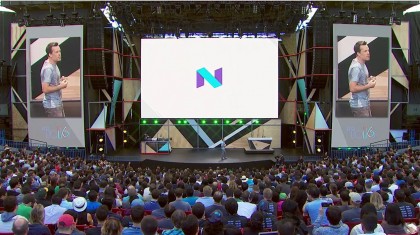
Introduction
The Google IO 2016 keynote has wrapped up and, as expected, there were a ton of cool announcements nestled inside of it.
From Android N, to the just-debuted Google Home, we've put together the biggest moments from today's keynote as they happened into one article so that you can get caught up on what mattered most.
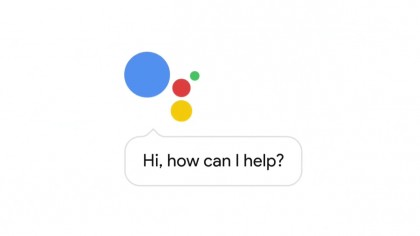
Google Assistant
We've had a taste of Google's virtual assistant in the past with Google Now, but the company's grand attempt at taking on Siri, Alexa and Cortana is coming soon.
The aptly titled "Google Assistant" will work similarly to today's "OK, Google" activated helper. The few biggest differences lie in how the Google Assistant learns and converses with you.
Upon asking it a question, like "show me which movies are playing nearby?", Google Assistant can further narrow down the search based on follow-up statements, like "I'm bringing the kids." It's smart enough to learn the context from the previous query and pull up relevant results.
In the case of attending an event that requires a ticket, the Assistant can make purchases on your behalf. It's all the cool Bot functionality that we saw from Facebook's F8 demo, but wrapped in a more personable layer.
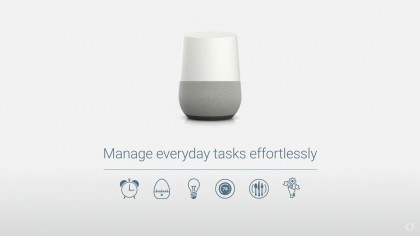
Google Home
Move over, Amazon. Google's take on the Amazon Echo is here. Google Home is a sleek, vase-like device that ties each of your connected devices together.
You can place it in any room within your home and thanks to its sensitive microphones, it can hear commands and queries easily. Whether you're curious about the meaning of Cinco de Mayo, or keen on shifting your appointments without lifting a finger, the Google Home aims to be a capable helper.
In addition to being a brain powered by Google's almighty search engine, Google Home struts its stuff as an essential entertainment component with its Cast capabilities. If any of your home entertainment gear is Google Cast-compatible, the Home can cast movies and music straight over.
Just like the Echo, Home has its roots in IoT. Nest integration is a given, but Google stated that developers can work to make more devices compatible in the future.
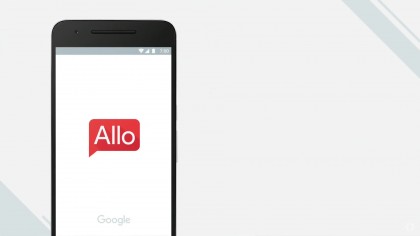
Allo and Duo
Next up, Google announced Allo and Duo, each of which will be available on iOS and Android. The former is a new messaging app that incorporates Google's search smarts into a rather traditional messaging framework. What sets it apart from the likes of Hangouts or iMessages are its predictive and assistive chops.
When someone sends you a message, Allo, over time, will be able to automatically provide some text responses that you tend to use within the context of your discussion. Google can also detect the little details in a picture, like whether it contains a pomeranian, a bernese mountain dog, or a plate of linguine with clams, to name a few of the examples shown off today. It will even offer end-to-end encrypted Incognito chat.
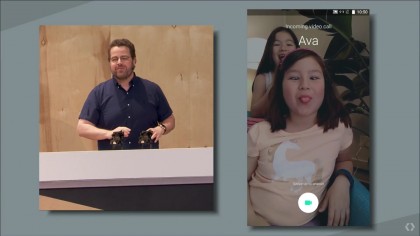
Touching on Duo, Google's take on FaceTime, it can be used as a supplement to Allo or by itself. The video calling software can gracefully scale video quality to create a consistent experience if your bandwidth gets choked during a chat session.
Additionally, it brings along a new feature called "Knock Knock", which shows who is on the other side before you pick up the Duo call. It's part creepy and magical, but I appreciate that it acts to give you a candid hint at what the caller is doing on the other side just before you answer.
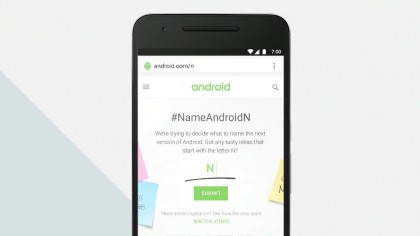
Android N-o name
Surprise! Android N still doesn't have an official moniker. While Google IO is usually the venue where the company sets the record straight on the next dessert-themed OS, Google said that "N" has proven to be a tougher challenge than the others. Who are they trying to kid? We think we came up with some awesome candidates for the Android N name.
It's not bad news, per se, as Google is giving you (yes, you!) a chance to decide its name.
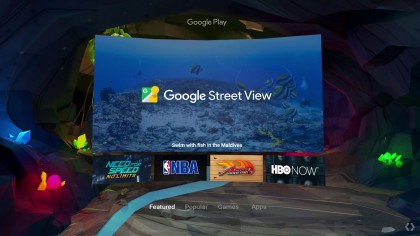
Daydream
Android VR has arrived as Daydream, Google's new initiative that will push VR on Android to new levels. Much like Google Cardboard, the framework of Daydream has been built by Google, but it's up to the developers to create the apps, games and experiences to help it flourish.
It showed off sketches of a reference VR headset, along with a Wii-like remote, which promises motion-controlled gaming and simple user interface navigation while using the Daydream headset.
Google also announced that several phones that are "Daydream-compatible" are coming from companies like HTC, Samsung and many more this year.
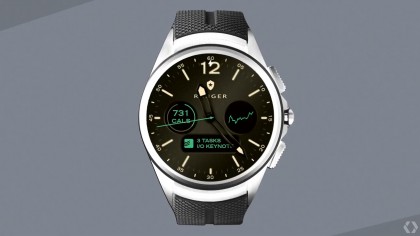
Android Wear 2.0
Google's ever-growing wearable platform is seeing its first major overhaul since its introduction in 2014.
It brings along a refined focus on fitness, ease of use in regards to messaging, and watch faces that up the ante in terms of interactivity and usefulness.
What's more is that many more of its best features will work without the need of a phone, so it's very likely that more 3G or 4G-enabled watches, like the LG Watch Urbane 2nd Edition LTE, will hit the market soon. Let's just hope that they bring along increased battery life in tow as well.
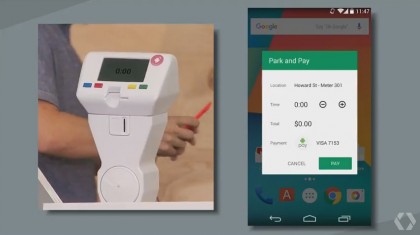
Android Instant Apps
This was unexpected. Google showed off an interesting proof of concept called Android Instant Apps that essentially lets you use apps without having to download them. Well, at least via the traditional app download route.
Let's say that you're shopping and you land on a URL from an e-commerce domain whose site may or may not be optimized for mobile. Android Instant Apps quickly downloads only the app's most core elements needed to, in this case, make a purchase.
It provides a win-win scenario. Instant Apps allows you to have an enjoyable and seamless experience without the need to download an app that may not ever use again.
- Stay tuned for more announcements at Google IO 2016

Cameron is a writer at The Verge, focused on reviews, deals coverage, and news. He wrote for magazines and websites such as The Verge, TechRadar, Practical Photoshop, Polygon, Eater and Al Bawaba.
Sign up for breaking news, reviews, opinion, top tech deals, and more.
You are now subscribed
Your newsletter sign-up was successful